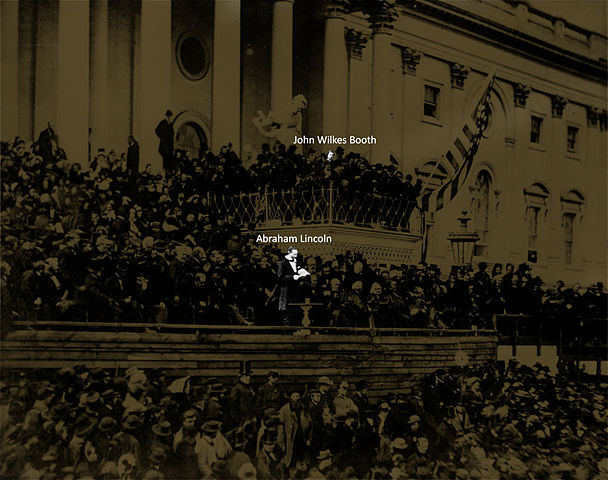
John Wilkes Booth attended Abraham Lincoln’s second inaugural address.
He told a friend, “What an excellent chance I had to kill the president, if I had wished!”

John Wilkes Booth attended Abraham Lincoln’s second inaugural address.
He told a friend, “What an excellent chance I had to kill the president, if I had wished!”

In November 1869 Missouri farmer Charles Burden sued his neighbor, Leonidas Hornsby, for shooting his dog Drum. Hornsby denied it, but neighbors had heard the shot and the dog’s cries of pain on the night in question, and Drum had been found dead of a gunshot the following morning. Furious, Burden sued Hornsby for $50, the maximum amount allowed by law. The two battled back and forth in the courts for a year. Finally, at end of the fourth trial, Burden’s attorney George Graham Vest rose to make this closing argument:
Gentlemen of the jury. The best friend a man has in the world may turn against him and become his enemy. His son or daughter whom he has reared with loving care may prove ungrateful. Those who are nearest and dearest to us, those whom we trust with our happiness and our good name, may become traitors to their faith. The money that a man has he may lose. It flies away from him perhaps when he needs it most. A man’s reputation may be sacrificed in a moment of ill-considered action. The people who are prone to fall on their knees to do us honor when success is with us may be the first to throw the stone of malice when failure settles its cloud upon our heads. The one absolutely unselfish friend that a man can have in this selfish world, the one that never deserts him, the one that never proves ungrateful or treacherous, is the dog.
Gentlemen of the jury, a man’s dog stands by him in prosperity and in poverty, in health and in sickness. He will sleep on the cold ground when the wintry winds blow and the snow drives fiercely, if only he can be near his master’s side. He will kiss the hand that has no food to offer, he will lick the wounds and sores that come in encounters with the roughness of the world. He guards the sleep of his pauper master as if he were a prince.
When all other friends desert, he remains. When riches take wings and reputation falls to pieces, he is as constant in his love as the sun in its journey through the heavens. If fortune drives the master forth an outcast in the world, friendless and homeless, the faithful dog asks no higher privilege than that of accompanying him, to guard him against danger, to fight against his enemies. And when the last scene of all comes, and death takes the master in its embrace and his body is laid in the cold ground, no matter if all other friends pursue their way, there by his graveside will the noble dog be found, his head between his paws and his eyes sad but open, in alert watchfulness, faithful and true, even to death.
Burden won, getting $50 and justice for his dog. Hornsby appealed to the state supreme court but lost.
Vest, the attorney, had said he would “win the case or apologize to every dog in Missouri.”
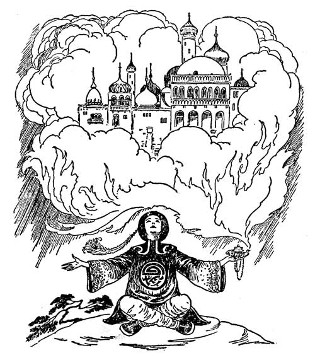
Aladdin, the best-known of the tales in the Arabian Nights, is not an authentic folk tale — it was written and inserted into the book by its French translator, Antoine Galland, in 1709.
Galland said that he’d heard the story from a Syrian monk, but there’s no precedent for it in the Arabic tradition — the story was unknown until Galland published it.
(Thanks, Joseph.)

All climbers stop short of the peak of Kangchenjunga, the world’s third highest mountain. Joe Brown and George Band, who in 1955 became the first to climb the 28,169-foot Himalayan peak, stopped short of the summit to honor a promise given to the Maharaja of Sikkim that the top would remain inviolate. Every subsequent expedition has followed this tradition.
At 7,247 feet, Mount Townsend, below, is the second-highest peak in Australia, 63 feet shorter than nearby Mount Kosciuszko. By tradition each person who climbs it carries a rock to leave at the top, so that eventually it might surpass its neighbor.
In 2006 workers discovered a piano near the summit of Britain’s highest mountain, 4,409-foot Ben Nevis in the Scottish Highlands. “Our guys couldn’t believe their eyes,” conservation trust director Nigel Hawkins told The Guardian. “At first they thought it was just the wooden casing but then they saw the whole cast iron frame complete with strings.” Scots woodcutter Kenny Campbell came forward to acknowledge that he’d carried it up the mountain 35 years ago to support a charity. “When I got there,” he said, “I played ‘Scotland the Brave.'”

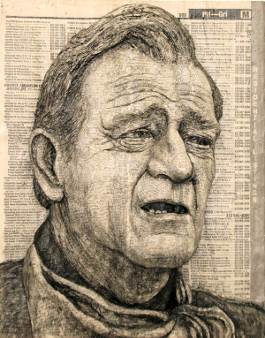
Artist Alex Queral found himself spending a fortune in paint to create the thickly textured portraits he favored. He switched media and began carving them instead, at first out of Styrofoam, then “on another day noticed a stack of old phone books outside waiting to be recycled. It occurred to me that they were not unlike blocks of very soft wood, and there it all began.”
“Taking an ordinary phone book, Alex Queral carves a face into this object of so many faceless names,” writes Laura Heyenga in Art Made From Books (2013). “With a very sharp X-Acto knife, a little pot of acrylic medium to set detail areas, and a great deal of craft, Queral literally peels away the pages of the book as if they were the layers of an onion to reveal the portrait within. Once the carving is complete, he will often apply a black wash to enhance the features and then seal the entire book with acrylic to preserve the work. However, he never loses the line registration, and the book remains quite pliable.”
In 1980 Philip K. Dick was asked to forecast some significant events in the coming years. Among his predictions:
1983: The Soviet Union will develop an operational particle-beam accelerator, making missile attack against that country impossible. At the same time the U.S.S.R. will deploy this weapon as a satellite killer. The U.S. will turn, then, to nerve gas.
1989: The U.S. and the Soviet Union will agree to set up one vast metacomputer as a central source for information available to the entire world; this will be essential due to the huge amount of information coming into existence.
1993: An artificial life form will be created in a lab, probably in the U.S.S.R., thus reducing our interest in locating life forms on other planets.
1997: The first closed-dome colonies will be successfully established on Luna and on Mars. Through DNA modification, quasi-mutant humans will be created who can survive under non-Terran conditions, i.e., alien environments.
1998: The Soviet Union will test a propulsion drive that moves a starship at the velocity of light; a pilot ship will set out for Proxima Centaurus, soon to be followed by an American ship.
2000: An alien virus, brought back by an interplanetary ship, will decimate the population of Earth, but leave the colonies on Luna and Mars intact.
2010: Using tachyons (particles that move backward in time) as a carrier, the Soviet Union will attempt to alter the past with scientific information.
Also: “Computer use by ordinary citizens (already available in 1980) will transform the public from passive viewers of TV into mentally alert, highly trained, information-processing experts.”
(From David Wallechinsky, Amy Wallace, and Irving Wallace, The Book of Predictions, 1980.)
Weil’s Law of University Hiring: “First-rate people hire other first-rate people. Second-rate people hire third-rate people. Third-rate people hire fifth-rate people.” (from French mathematician André Weil)
“Slowness is frequently the cause of much greater slowness.” — Montesquieu
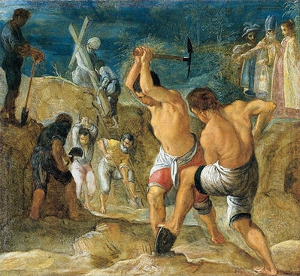
A puzzle by Pierre Berloquin:
Timothy, Urban, and Vincent are digging identical holes in a field.
Working alone, how long does it take Timothy to dig one hole?
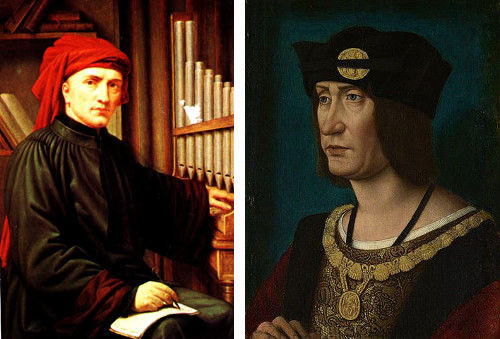
A good anecdote is told of Josquin [des Prez] and his royal patron, Louis XII. The king was particularly fond of a certain popular song, and desired Josquin to arrange it for several voices, and to include a part for himself (Louis). The last condition was rather a puzzle for the composer, as the king knew nothing of music, and had a very bad and unpliant voice; however, he set to work, wrote a canon on the melody for two boys’ voices, added a part for the king which he marked ‘Vox Regis,’ consisting of only one constantly repeated note, and placed below a bass part which he took himself.
— Musical Times, June 1, 1884
The Indonesian word for water is air.
The Czech word for guest is host.
The Basque word for cold is hotz.
The Hebrew word for she is he.
(Thanks, Alec and Daniel.)